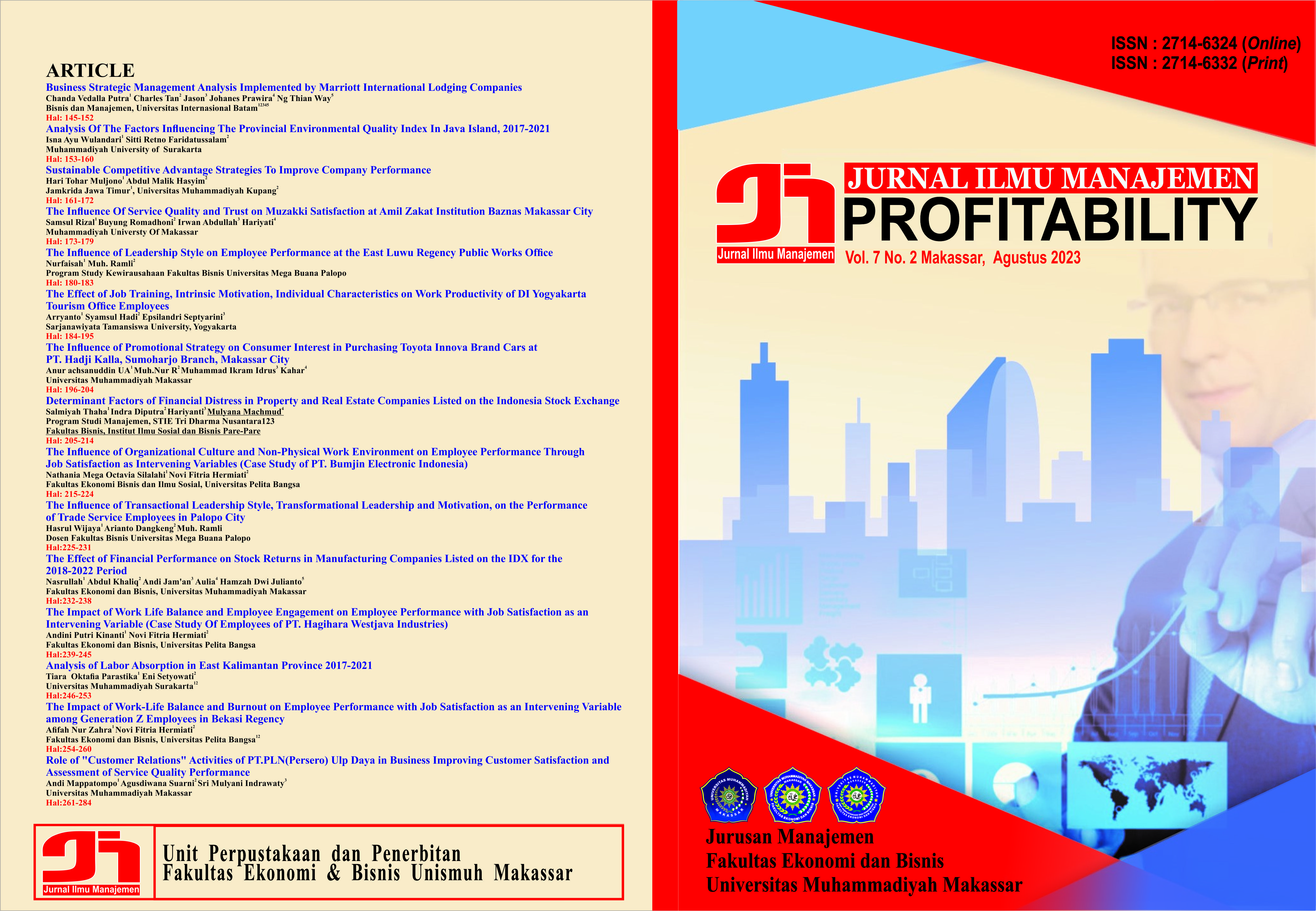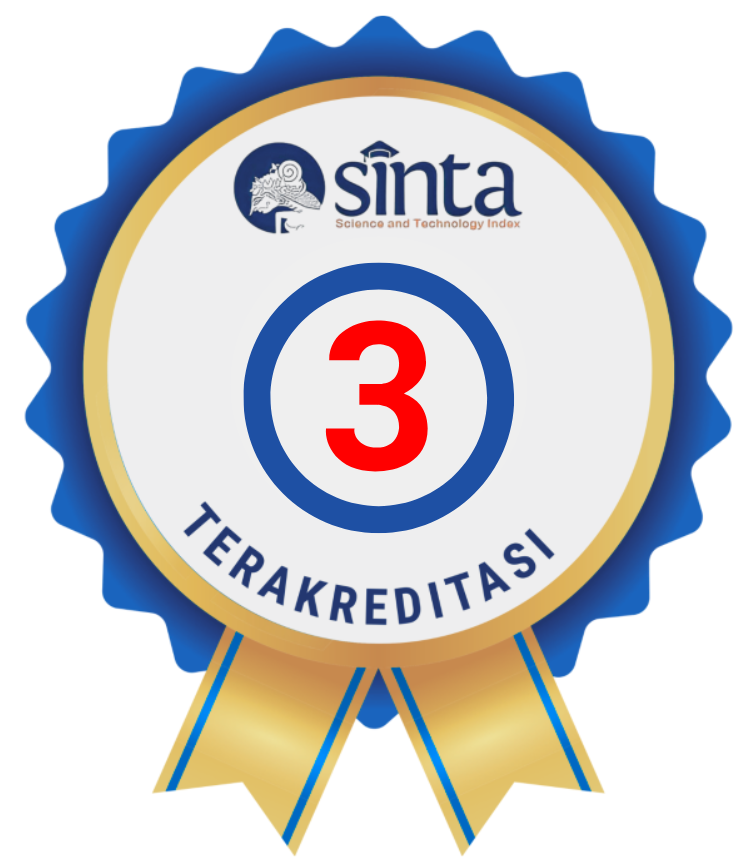The Impact of Leadership Style on Employee Performance at the Public Works Office of East Luwu Regency
DOI: https://doi.org/10.26618/profitability.v7i2.11946
Transactional Leadership, Transformational Leadership, and Motivation affect employee performance
Abstract
Leadership, Transactional Leadership, and Motivation with the Performance of Public Works Department employees of East Luwu Regency on the performance of district public works employees. East Luwu. This research was conducted with the aim of: (1) analyzing the transformational leadership style on employee performance, (2) analyzing the effect of transactional leadership style on employee performance, (3) analyzing the effect of motivational style on employee performance, (4) analyzing which leadership style is has the most dominant influence on employee performance. The results of this study are waiting for a saturated sample where the total population of 49 people is used as the research sample, the survey was conducted from August to September. The results of this study show that: (1) transformational leadership style has a positive but not significant effect on employee performance (2) transactional leadership style has a negative but not significant effect on employee performance, (3) motivation has a positive but not significant effect on employee performance, ( 4) motivation is the dominant factor influencing leadership style, (5) the contribution of transformational leadership, transactional leadership, and motivation on employee performance is 19.9%.This means that a good leadership style is one of the determining factors for employee performance.
References
Anwar, Prabu, 2006, Sumber Daya Manusia, Terampil dan Ahli Dalam Bidang Kerja Pertanian, Penerbit Raja Grafindo, Persada Jakarta
Arya, 2000, Manajemen Sumber Daya Manusia, Bumi Aksara, Jakarta.
Bass, Bernard M. And Avolio, Bruce, J. (2003), “Transformational Leadership and Organizational Culture”. PAQ, Spring.
Malik, Abdul, 2004, Teori Motivation Hygene dan Pola Motivasi Kerja, Syarief Rusli, 1994, Tehnik Manajemen latihan dan Pembinaan, Penerbit Angkasa Bandung.
Rokhman wahibur dan harsono 2002. “Peningkatan Pengaruh Kepemimpinan Transformasional Terhadap Kepemimpinan Transaksional Pada komitmen Organisasi Dan Kepuasan Bawahan”. Emprika, Volume 11, Juni 2002
Stone, G. A., Rusel, RF., and Petterson, K. Transformational Versus Servant Leadership: A Differnce in Leader Focus, The Leadership & Organization Development Journal, Vo. 25 No. 4, 2004, pp. 349-361. Sunarsih. 2001. “Kepemimpinan Transformasional Dalam Era Perubahan Organisasi” Jurnal Managemen Dan Bisnis. Vol 5 No. 2. Desember 2001: 106-116
Suranta, Sri 2002. “ Dampak Motivasi Karyawan Pada Hubungan Antara Gaya Kepemimpinan Dengan Kinerja Karyawan Perusahaan Bisnis” Jurnal Penilitian Ekonomi Bisnis dan Pembangunan Vol 15 No.2 Desember 2002: 166-138
Swandari, Fifi 2003. “Menjadi Perusahaan yang Survive Dengan Transformasional Leadership” Jurnal Ekonomi, Manajemen dan Akuntasi Vol. 1 No.2 Mei 2003: 93-102
Utami, Sri 2006. “Pengaruh Kepemimpinan Transformasional Dan Motivasi Kerja Terhadap Kinerja Karyawan: UNS.
Thoha, Mitah, 2003, Perilaku Organisasi, Konsep Dasar dan Aplikasi, Ajagafindo Persada, Jakarta.
Veithzal Rivai, 2004, Performance Appraisal, Sistim yang tepat Menilai Kinerja Karyawan dan meningkatkan Daya Saing Perusahaan, Penerbit PT. Raja Grafindo persada.
Wahyuningsih, Tri. 2003 “ Sistem Penilaian Kinerja Sebagai Motivator Karyawan” Jurnal Manajemen dan Bisnis. Vol 7 No. 1 Juni 2003: 44-55
Waridin dan Masrukhim, 2006, “Pengaruh Motivasi Kerja, Kepuasan Kerja, Budaya Organisai, dan Kepemimpinan Terhadap Kinerja Pegawai”, Ekobis, Vol.7, No.2.
Witjaksono, Bayu, 2003, Pengaruh Gaya Kepemimpinan Orientasi Hubungan Terhadap Kepuasan Kerja dan Dampaknya Terhadap Kinerja NN. tersedia di: http://jurnal-sdm.blogspot.com/2009/06/kepemimpinan-transformasional-dan.html.
Downloads
Published
Issue
Section
License
Authors who publish with Jurnal Ilmu Manajemen Profitability agree to the following terms:
Copyright of the articles remains with the authors.
Authors grant the journal the right of first publication with the work simultaneously licensed under a Creative Commons Attribution-NonCommercial 4.0 International License (CC BY-NC 4.0). This license allows others to:
Share (copy and redistribute the material in any medium or format)
Adapt (remix, transform, and build upon the material)
as long as they give appropriate credit to the original author(s) and source, provide a link to the license, and indicate if changes were made. Non-commercial use only.
Authors are permitted to:
Distribute their published work (e.g., post it to an institutional repository or publish it in a book), with an acknowledgment of its initial publication in this journal.
Enter into separate, additional contractual arrangements for the non-exclusive distribution of the journal’s published version of the work (e.g., post it to a class website or institutional archive).
For permissions to use the content published in this journal beyond the scope of the license (e.g., commercial purposes), please contact the editorial office via the journal email.
License Details:
This journal is licensed under a Creative Commons Attribution-NonCommercial 4.0 International License (CC BY-NC 4.0).












